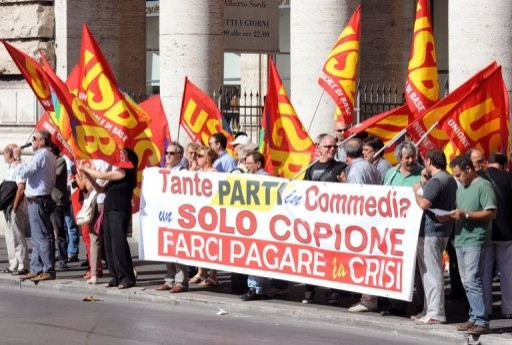Italian Union Members Strike to Protest Government's Austerity Cuts

Trade union members in Italy have turned out by the millions in a general strike to protest the government’s latest raft of austerity measures, which call for up to 45.5 billion euros ($64.1 billion) in spending cuts.
As a result, transportation in the country has come to a standstill --- airplane flights are canceled, trains and buses remain in their sheds and government offices are closed.
The Italian General Confederation of Labour, the largest national trade union, which called the strike, is demanding greater protection of jobs and stronger prosecution of tax evaders, among other issues.
This [austerity] is a plan the country doesn't deserve, CGIL union boss Susanna Camusso told a crowd of strikers in Rome. “The government has not been up to the task of handling this crisis. This is an unfair and useless budget plan and totally irresponsible as it hits workers and pensioners.”
The government’s austerity plan, which was originally proposed on Aug. 12, provides for clauses that would make it easier for employers to fire workers.
Some measures have already been rescinded, for example, a supertax on anyone earning more than 90,000 euros ($127,000) per year, after prominent Italians, including football players, loudly protested. Other proposals, including pension reforms and changes in the retirement age have also been scrapped or amended.
Interestingly, some smaller unions have reportedly not participated in the strike, citing that protests are pointless when everyone’s jobs are at stake.
The CGIL itself said that 58 percent of workers stayed off the jobs; however, according to a poll taken by Innovation Minister Renato Brunetta, only 3.1 percent of public sector employees joined the strike.
Meanwhile, alarm is growing in the eurozone that Italy’s financial and debt problems may be insurmountable.
Jim O’Neill, chairman of Goldman Sachs Asset Management, said in a note to investors: “The Italian government appears to be in some disarray as it has backtracked on some of the more unpopular measures. Many European policy makers appear to be in a state of shock about this particular twist. This is not surprising given the intensity of debate about ECB actions to support the beleaguered Italian bond market.”
The Italian Parliament, at the urging of the European Central Bank and other eurozone partners, are planning to pass the amended austerity bill this week.
© Copyright IBTimes 2024. All rights reserved.





















